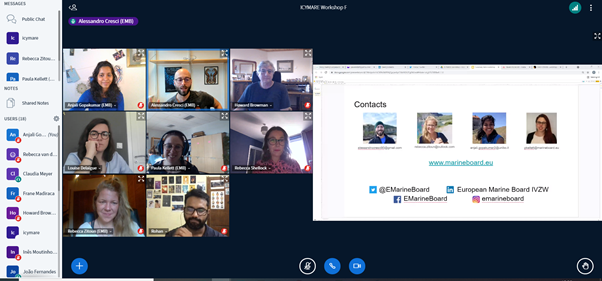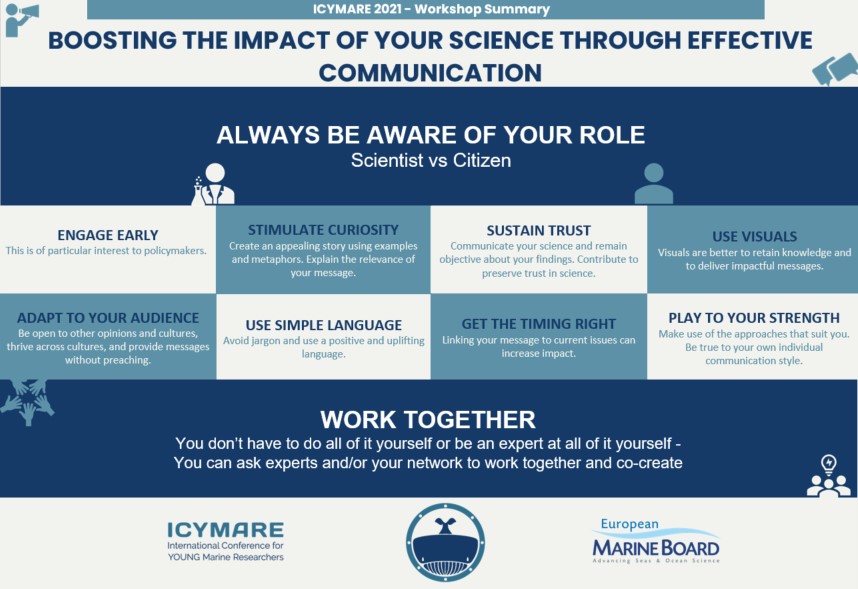One of our roles as an EMB Young Ambassador entails communicating our research and the importance of marine science to our peers, relevant stakeholders, and the public. So, we can assure you that as EMB Young Ambassadors, we understand the challenges of communicating science in a simple, concise, and accurate manner. These are key elements for science to have an impact on the outside world. As communication is a comprehensive and important skill, the general lack of training and accessibility to learning tools is a real challenge for early career ocean professionals (ECOPs). For this reason, we decided to organize a 3 hour- workshop to expand the horizons of science communication for ECOPs.
As part of the ICYMARE 2021 Conference (International Conference for YOUNG Marine Researchers), Alessandro Cresci, Rebecca Zitoun, and I (EMB Young Ambassadors), along with Paula Kellett (EMB Secretariat) organized a workshop on science communication, called "Boosting the impact of your science through effective communication: Learning how to be heard by media, policy makers and stakeholders", on 23rd September 2021. Our 24 attendees listened to our five remarkable speakers talking about different aspects of effective science communication, i.e. intercultural communication, communication with science policy, the power of science illustration, and the complex world of scientific writing and publication.

Organizers of the ICYMARE Workshop, “Boosting the impact of your science through effective communication: Learning how to be heard by media, policy makers and stakeholders”, in a clockwise direction: Anjali Gopakumar, Alessandro Cresci, Rebecca Zitoun, Paula Kellet
Louise Delaigue (NIOZ, Netherlands) got the ball rolling, starting us off with the importance of making communication intercultural and non-biased. She explained the significance of empathetically listening and understanding others’ opinions, while also communicating our science to our best ability.
Dr. Rebecca Shellock (ANU, Australia) took over next, providing us with an overview of her work at the science-policy interface. She also presented tips and tricks in communicating and engaging with policymakers, recommending an appealing and narrative approach, while adapting to the needs of the audience. She encouraged engaging and creating a foundation of trust early on, communicating in short, concise briefs and emphasized the importance of getting our timing right, especially when communicating science to policymakers.
Our next set of speakers were cartoonists & illustrators, Rohan Chakravarty (Green Humour, India, also on Instagram) and Steffen Kraft (Iconeo, Germany, also on Instagram) who launched into the significance of using visual imagery and subtle humour to deliver powerful and impactful messages, while also offering us a view of their beautiful, introspective comics on environmental challenges including pollution, exploitation etc. They provided us with valuable tips that we can use to express our science in images - including the avoidance of jargon, using simple text or even no words with our illustrations, stimulating curiosity and conveying emotions to make our message more impactful and inspirational. They also explained that finding the idea and designing the illustration that works for us takes time, research and is a long and repetitive process, but ultimately a rewarding one.
Our last speaker, Dr. Howard Browman (IMR, Norway) brought up numerous significant issues that hinder the growth and success of an ECOP, focusing on two topics in particular- scientific publications and our roles as scientists. He expressed the strain surrounding the continuous pressure on scientists to publish in scientific journals, bringing about the risk of publishing unvetted information just for the sake of being expeditious, and the culture of spinning or exaggerating positive words by suppressing the negative ones for better chances of publication. He also recommended that ECOPs should focus on what is most relevant for their job at hand, because being involved in one too many things, erodes our role as a trusted source of knowledge for society. Another interesting element that he brought up was the need to separate our roles as citizens and scientists- presenting an opinion as a citizen is completely different from providing advice as a scientist, and we must always be aware of this distinction.

An engaged discussion in progress with all the speakers, from left to right: Dr. Howard Browman, Louise Delaigue, Dr. Rebecca Shellock, Rohan Chakravarty (missing Steffen Kraft).
The talks by our speakers and the ensuing discussion were extremely interesting, kicking off numerous talking points and bringing up some noteworthy topics. One of the most useful takeaways from our workshop, agreed upon by all the speakers and attendees, is best explained in this brilliant graphic designed by Rebecca Zitoun- “Work together”. While it is academically encouraged to be a jack of all trades, our workshop concluded with many of us realising the futility of researchers trying to do everything by themselves. Each of us needs to play to our respective strengths and work together with actors across different disciplines to be a productive and accomplished scientist. For instance, while researchers work on the actual science, visual communication of their science can be support by illustrators, promotion of the research on social media can be assigned to social media managers and so on. Expecting an ECOP to be versatile in one too many things takes away the focus from their actual expertise- science, and research. And while this certainly brings up further issues regarding funds, accessibility etc., it is still worth considering and keeping in mind as growing ECOPs, as we advance in making our mark in science and academia.
 Graphic designed by Rebecca Zitoun, highlighting the main takeways from the workshop.
Graphic designed by Rebecca Zitoun, highlighting the main takeways from the workshop.